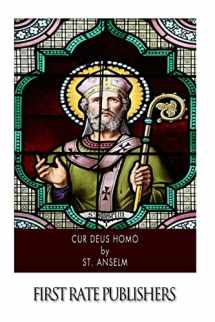
Cur Deus Homo
Book details
Summary
Description
Anselm of Canterbury (circa 1033-1109), also called of Aosta for his birthplace, and of Bec for his home monastery, was a Benedictine monk, a philosopher, and a prelate of the church who held the office of Archbishop of Canterbury from 1093 to 1109. Called the founder of scholasticism, he is famous as the originator of the ontological argument for the existence of God. Anselm was proclaimed a Doctor of the Church in 1720 by Pope Clement XI. Although utterly convinced of the truth of Christianity, Anselm of Canterbury struggled to make sense of his religion. He considered the doctrines of faith an invitation to question, to think, and to learn, and he devoted his life to confronting and understanding the most elusive aspects of Christianity. In Why God Became Man, Anselm tries to answer the question of the incarnation of God in the form of Jesus Christ, concluding that neither men nor God owed anything to the Devil, and that our only debt was to God. Christ died in our place because there was no way we could pay the debt ourselves. Anselm’s theory is highly popular, though not the only one—Abelard, for example, violently disagreed. It is called “Penal substitution” because Christ was substituted in our place and paid our penalty. Anselm was equally radical in his emphasis on human reason. You will notice that this writing is unusual in not containing a single Scripture reference.


We would LOVE it if you could help us and other readers by reviewing the book
Book review



